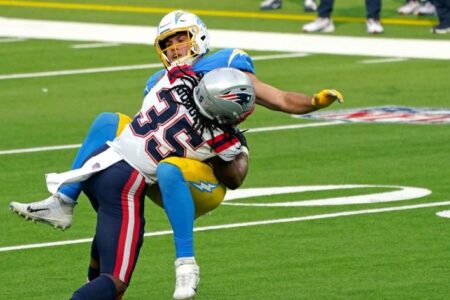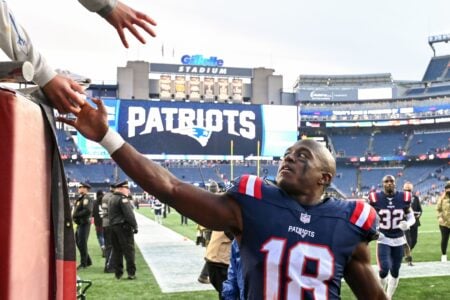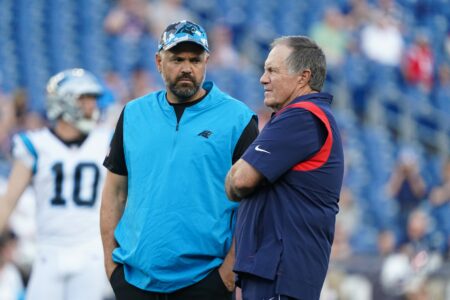Re: Don Banks: Behind the rhetoric...what a fair deal in NFL labor debate will look l
As far as the loss of low profitable, and small market teams I see only better financial grounds for the survivors.
Whether you have two teams, 32 teams, or 132 teams there is always going to be one that is most profitable and one that is least profitable. How do you propose that the NFL determines what is acceptable and what is not? If 32 is not the right number of teams, then what is? Why is that other number right and 32 wrong?
As it is the bottom feeder teams are not selling their market share within the nfl, wether it is natinal TV time, NFL gear, team related advertising, the entire package. Yet they collect their share of revenue shareing. It dosn't matter if it is geogaphical demographics or quality of games, it is on the individual owner to correct there own problems instead of collecting what is the NFL equivalent of welfare.
What is acceptable and non-acceptable in your view? The Raiders are one of those low-value, low-profit franchises, but their apparel sales remain high. Every year somebody is going to finish with the least wins, somebody is going to have the lowest attendance, somebody is going to have the lowest sales of licensed apparel. What exactly is your plan? To eliminate whomever ranks at the bottom in these categories last year? For how long, one year, five years? How many teams do you eliminate, and why that number? Thankfully for Pats fans this plan wasn't in place before Schaefer Stadium was in place or while Victor Kiam was the owner.
The bigger question is this: where is the money going to come from to buy out that team, the lease on their stadium, the severance pay, etc? Whatever gain is made by splitting the pie into fewer pieces could easily be more than lost with those additional expenses.
A team that is not surviving in a low marketable area must move to survive as many other franchises have done.
It takes time to build a fan base. Constantly moving for greener pastures is not a good idea. Do you want the NFL to resemble the NHL? Other than LA, what market is not being served?
If management changes are nessisary they must make them. If ownership is the problem (as with the Raiders) the NFL must stop helping with revinue shareing to force ownership out.
You're going to arbitrarily stop revenue sharing for one team but continue it for others? Can you say lawsuit with treble damages? However I do agree it would be in the NFL's best interest to help with advice to a team that constantly struggles to put a competitive team on the field.
The 2/32 loss of two nonprofitable teams does not represent 2/32 of the total nfl income. I do not wish to speculate on the percantages but it is highly evedent that their loss will not represent their 2/32 percentage. TV ratings are high, but only for the high earning more succesfull teams. You will not see the Bills playing Detroit on national TV or even in new england out side the buffalo region.
Team's success ebb and flow; that was part of the plan with the salary cap to coincide with free agency. There was a time the Pats were not on tv. Just a few years ago the Rams were on every other week. Remember when the 49ers and Raiders were on all the time?
But you will see Pats, Jets.Giants on national TV regularly.
That has more to do with the size of the television market than anything else. So your plan is to reward big market teams and punish other teams simply because they are in smaller markets?
Who is paying the bills, and who is sucking profits from the earners. If Tampa bay ,Jacksonville, and Miami can not be sustained in close proximity maby some one must move to survive.
Florida is also more hard hit by the housing crisis than probably any other state. As far as close proximity, you're talking four, five and six hour drives. The issues they have are not due to proximity. Tampa is the 13th largest television market, Miami 16th; the television networks are not going to be happy paying what they do without NFL teams in those markets.
Jacksonville is a different story. At the time the franchise was awarded there was a large population shift to the south. It was projected the market would grow; that's a mistake that should probably be rectified with a move to another city such as Los Angeles.
As long as ownership partisipates in revenue shareing there is very little incentive for the bottom feeders to correct there problems and increase investments in there future.
The reverse is just as true; with no revenue sharing there is no incentive to field a competitive team. There already are measures in place in regards to revenue sharing. Back in the days before the cap the Tampa Bay Bucs were the worst team in the NFL, yet they were also the most profitable because Hugh Culverhouse spent as little money as possible, especially on player salaries. That business plan is somewhat out the door today because there is a salary floor to go along with a salary cap.
And as far as moving a team goes, forget it. With no revenue sharing it will be impossible for a team to survive while it builds its fan base. A solid fan base does not happen overnight; it takes a full generation to take root and become incorporated in the family and the community. Those teams need to have that revenue sharing to build the relocated franchise.
Obviously you are very passionate (and adamant) about your position - even if it is odd considering that you are a union guy. I whole heartily agree that compromises should be, and need to be made. But I have to disagree that the solution is draconian measures like contraction of franchises and an end to revenue sharing.


















